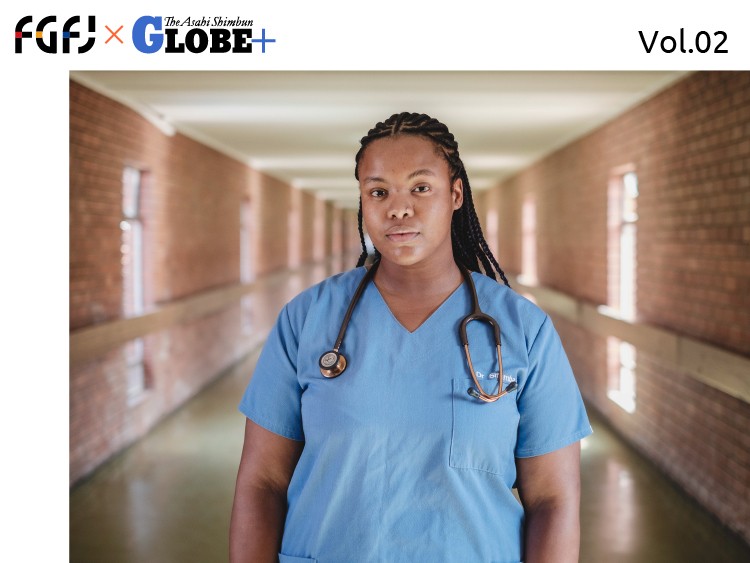
Zolelwa in scrubs ©The Global Fund/Joubert Loots 2019
The Friends of the Global Fund, Japan (FGFJ) and Asahi GLOBE+ are pleased to introduce Dr. Zolelwa Sifumba, a young physician from South Africa, in the second installment of our interview series, “Infectious Diseases Without Borders–Our Story.” She was chosen to run as a member of the Global Fund’s torch relay team for the 2020 Tokyo Olympics, which was postponed due to the pandemic. Sifumba contracted multidrug-resistant tuberculosis when she was a medical student and survived a grueling treatment that lasted 18 months. Five years later, she fell ill with COVID-19 while working on the pandemic frontlines. Now, Sifumba considers herself a better doctor for being able to understand what it is to be a patient, and her personal experiences have made her even more determined to raise awareness about tuberculosis and the fact that we are all susceptible to this disease because “we all breathe.” It has also inspired her to highlight the plight of health professionals who are fighting off myriad risks with minimal support on a daily basis. We are pleased to be able to share the story of her indomitable spirit and her message to all of us living in the COVID age.
To read this article in Japanese, please visit the Asahi Shimbun’s GLOBE+ website.
The Unexpected Diagnosis of Tuberculosis and the Fight that Ensued
Q: Can you tell us about your experience with multidrug-resistant tuberculosis (MDR-TB)?
In 2012, while studying to become a medical doctor, I was diagnosed with MDR-TB. My chest was clear. I wasn’t coughing. I wasn’t losing weight. It was just my lymph node getting swollen, about 3 by 3 centimeters on my neck and it was painful. No other symptoms at all. I had breathed it in, but had it in my lymph node, so it wasn’t contagious. But I still had MDR. I was shocked. To be honest, I didn’t know that as healthcare workers and students, our risk of contracting TB is actually quite high.
Tuberculosis (TB) is a bacterial illness that spreads through the air when a person with TB of the lungs coughs or sneezes. It commonly affects the lungs but can also affect other parts of the body. Multidrug-resistant TB (MDR-TB) is defined as TB bacteria that are resistant to the two most powerful first-line TB medications, and it is associated with fewer treatment options and higher mortality rates. At the time of Sifumba’s diagnosis in 2012, the 18-month treatment for MDR-TB required very painful, daily injections for the first six months in addition to oral medication. The negative side effects of this treatment range from joint pain, nausea, and diarrhea to loss of hearing, psychosis, kidney failure and more. Only 40% of people with MDR-TB on treatment survived at that time.
Q: Why were you shocked about getting TB?
TB had all these negative connotations and all these myths and stigmas attached to it. TB is seen as a poor man’s disease, a dirty disease associated with poverty and bad behavior. The usual demographic is the person living in a one-bedroom house and sharing the house with 10 people, and of low social-economic status. Another significant stigma associated with tuberculosis is that everyone who has it is infected with HIV/AIDS. I am middle social-economic status, I’m well educated, I’m not HIV-positive, so it didn’t make sense that I’d be able to get it.
The one thing I would want people to know about TB is that anyone can get it. We all breathe and are at risk. It has nothing to do with anything else besides that you breathe, that you can get it anywhere, under any circumstances.
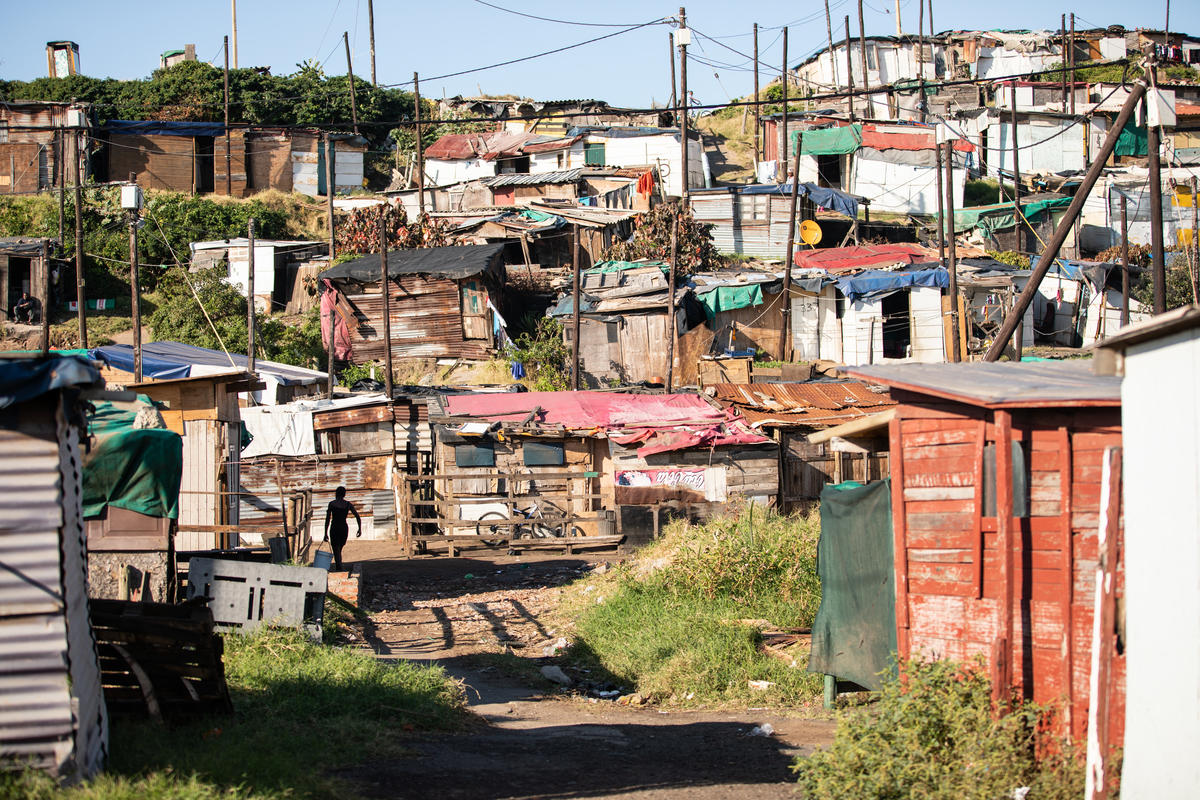
Crowded South Africa township ©The Global Fund/Vincent Becker
Q: What was life with TB like?
The 18 months that would follow that diagnosis was absolute torture. Clinic visits were the worst. After a few hours of waiting your turn would come. You would swallow your 21 pills and get your daily injection. I never did get used to those injections; they felt like molten hot lava entering me. It was seriously painful. You felt it hours after the injection. After one month, my bottom was black and blue. I wasn’t able to sit, stand, or take a shower. Taking the pills, I’d often spend hours at the toilet seat spewing from both ends.
TB is so prevalent in South Africa — it is one of the highest burden countries in the world. We see so many that we couldn’t afford to hospitalize them all. So, we don’t hospitalize all the TB patients, and for the most part, people with MDR are treated as outpatients.
Slowly my desire to live was fading away; hours alone, sick and in pain, losing hope and fearing the worst. I considered quitting treatment every night. Either the drugs would kill me, or TB would kill me, or I would kill myself. I honestly felt like I was dying every day of treatment.
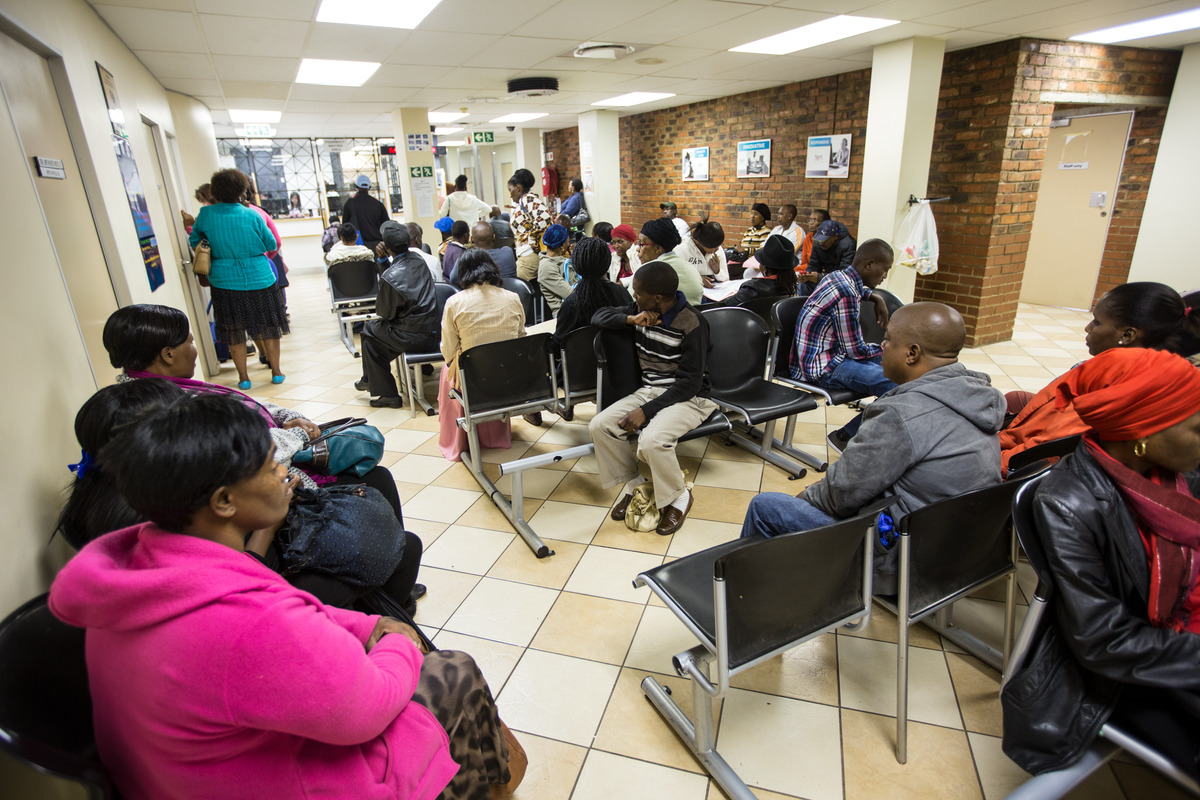
Hospital waiting room view ©The Global Fund / John Rae
Becoming a Doctor and an Advocate
Q: Why did you choose the medical profession? Has the experience of getting MDR-TB changed anything?
As a child, I wanted to be a doctor because my father was a doctor. It seemed glamorous. At that point, a part of me told myself that medicine is the only way to help people.
After I had TB and got better, I came to realize that there are many other ways to help people. I told myself that I want to be the kind of doctor that I would have wanted to treat me. I have been a patient. All the questions that I wanted asked are the questions that I’m asking people. It feels good to have that experience under my belt since I can even encourage people. I wish I could do something, like at medical schools, to get people to realize that it’s the soft skills that matter. I think we really need to focus on getting healthcare workers to understand the lived experiences of people receiving treatment for a variety of illnesses, so people can understand more. Just stop calling people defaults. Stop demonizing people who don’t want to take treatment because none of us like taking treatment. None of us like to be unwell.
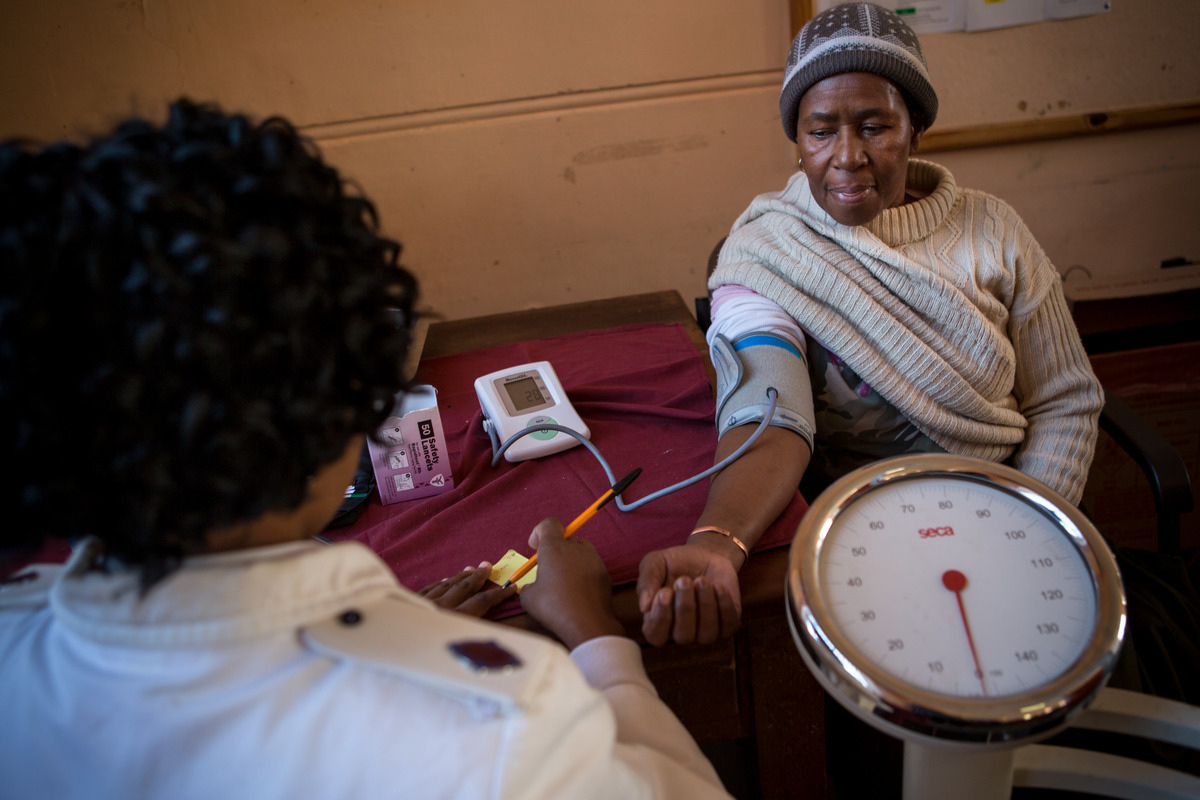
A tuberculosis patient being examined in the clinic. ©The Global Fund / Alexia Webster
Q: So, you are now active as an advocate for the Global Fund to Fight AIDS, Tuberculosis and Malaria (the Global Fund). Do you find that rewarding?
At first, I didn’t know anything about the Global Fund. It’s only after I got TB; when I connected with others who had TB and got introduced to the Global Fund as one of the major funders for TB, HIV, and malaria, only when I entered the TB world that I saw what the Global Fund does, and also through being invited to work with the Global Fund. I also learned that TB is still killing millions of people every year.
Infectious diseases affect the poorest of the poor. The poor people never had any say in any society. The poor people are the people that just take what they can get. It translates into, when people are diagnosed with TB, back then, I didn’t know that I could complain about the drugs that I was on. I didn’t know that advocacy could actually be done to improve those drugs and to get new drugs and to get more funding which is why it was so exciting to be a part of what the Global Fund is doing to ensure that the poorest of the poor don’t just suffer because they are not prioritized in their country.
It’s great to be a doctor, seeing things on the ground, who knows exactly what things need to be advocated for, and also being given the opportunity to advocate for such things. It helps me see that there actually is some kind of work that I am doing that is reaching a significant amount of people and getting them to change how they think about things, especially when it comes to health. So, advocacy is another thing that has helped me to go on. I enjoy doing it.
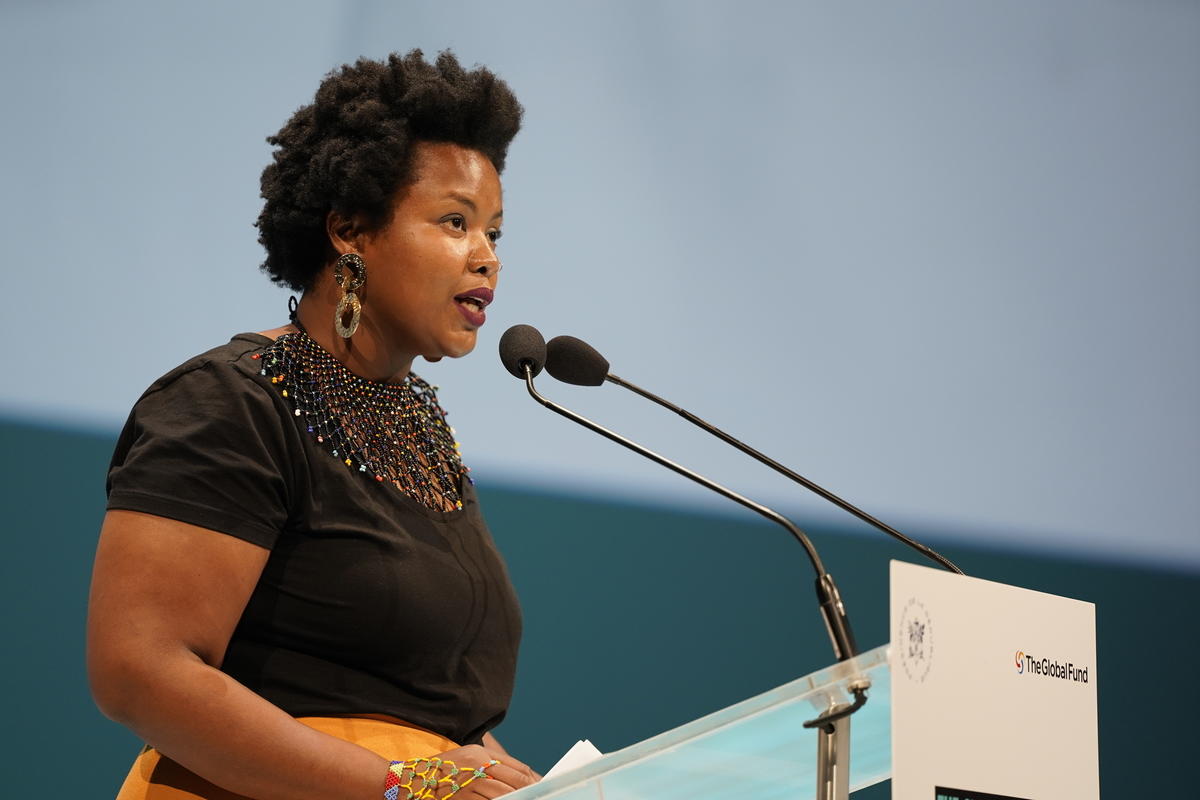
Zolelwa speaks about her experience with tuberculosis at the Global Fund’s Sixth Replenishment Conference in Lyon, France. ©The Global Fund 2019
Fighting COVID-19 on the Medical Frontlines
Q: You also contracted COVID-19. Has that impacted your thinking?
I feel that my journey and my hardships through medicine have highlighted the difficulties that thousands, millions across the world face. I meet so many people (=health workers) that are struggling, but we are just taught not to look after ourselves. It’s really frustrating to be on the ground as a doctor working so hard, working incessantly and your government is not helping you do the things that you need to do for the people. They are not supporting us.
I had a car accident because I was driving exhausted after a sleepless 30-hour shift and had a very bad back injury. Then I got COVID-19 and suffered an acute anxiety, but I had to return to work almost immediately. So, it is really tough. I decided to check myself into a psychiatric hospital for a month because there was so little in place to support me.
I definitely want to continue advocating for the better treatment of health workers because I am not the only community service worker that is panicking about next year. If I could have some influence in the world someday, I would just get more help for healthcare workers because it is a really tough job and the world leaders are counting on us. Yet so little attention is given to our own wellbeing. So, if I could change anything, I would advocate for a better support system for us because it’s a great job.
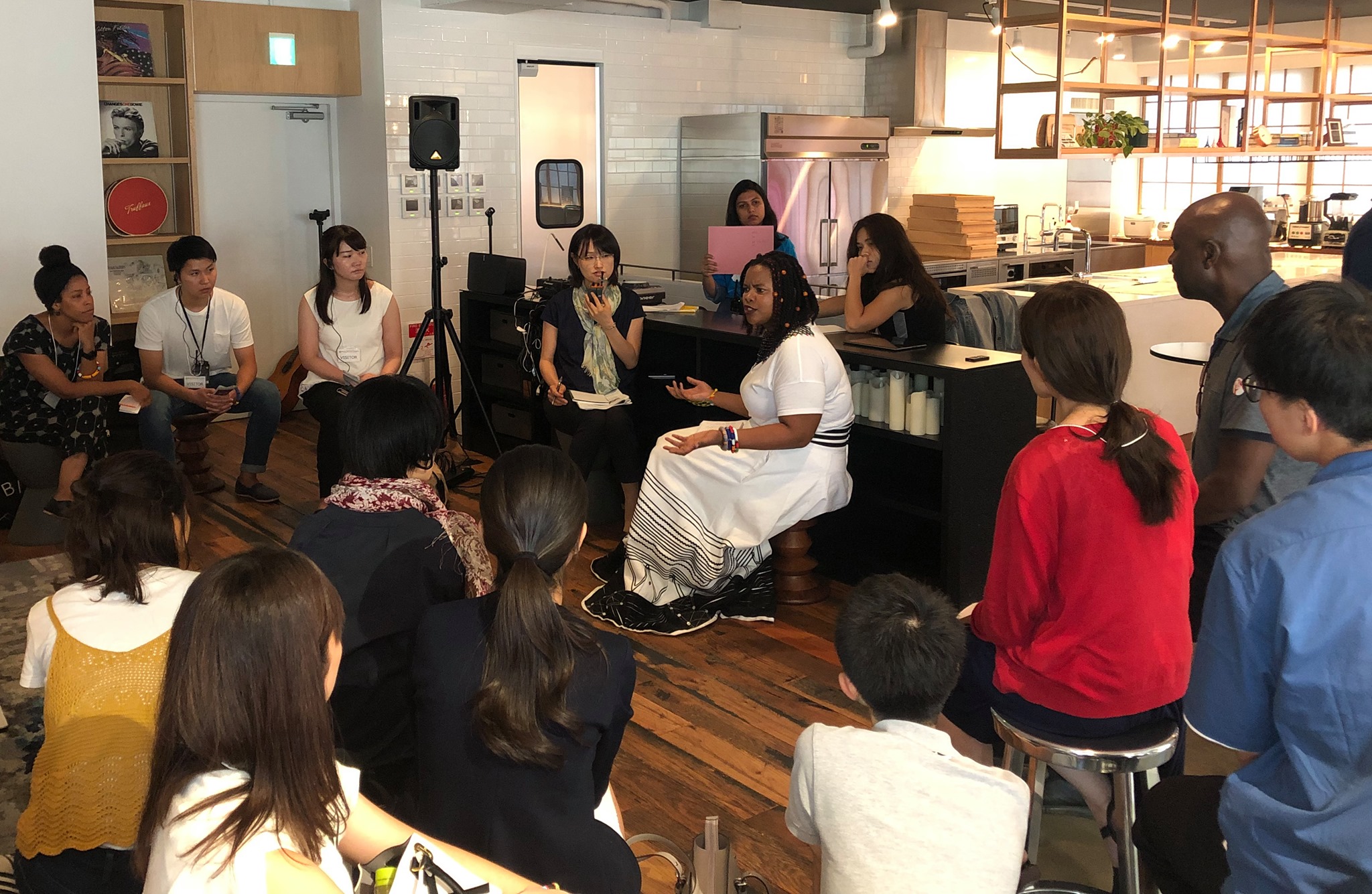
Zolelwa speaks about her experience with tuberculosis at a SwitchPoint event in Shibuya, Japan. ©The Global Fund / Shugo Takemi 2019
Q: Do you have a message for the readers as we struggle in the COVID-19 era?
I think the coronavirus really got people to understand that infectious diseases aren’t things to be played with. Just because you feel you are not the demographic doesn’t matter. Just because you feel it is affecting a certain country more than your country, it doesn’t matter because people move around. With your movement, you are trucking along all those bugs that you have in your system. It’s definitely getting people to realize that infectious diseases are a lot more serious than people think.
We lost so many lives, but it also reminded us that we are in charge of our own health. If you live in close proximity to people, you are in charge of your health and their health. It’s given people a sense of responsibility. Even though people are frustrated not being able to live a normal life, it’s gotten people to understand the effect that they have on society. What you do can end up influencing the whole of the world as much as one small action. How we act as individuals is going to determine whether the infectious diseases continue to kill us or whether we eradicate them.
I’m just one doctor trying to do my best for patients, but there is only so much that one doctor or one small hospital can do. This pandemic doesn’t care about where you’re from or where you live. Squelching it in one place means nothing if it’s raging somewhere else. And we need to squelch it completely. We need a global plan. And we need all of you to take part.
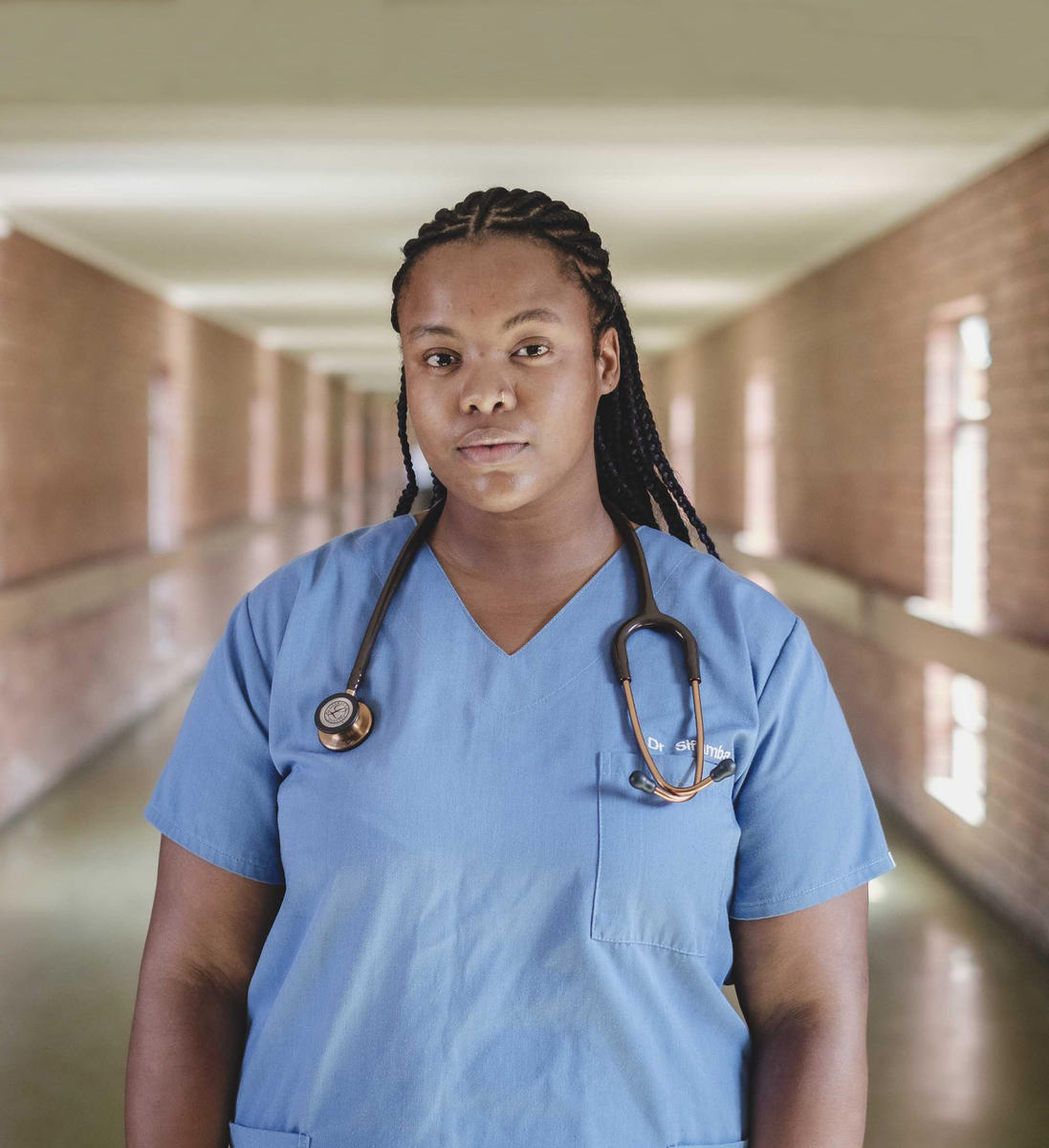
About Zolelwa Sifumba
Zolelwa Sifumba is a physician from East London, South Africa currently serving as a community service medical officer at a district hospital in Harding. Born in 1990, she completed her medical degree at the University of Cape Town in 2017. She contracted multidrug-resistant tuberculosis as a result of her occupational exposure during her studies as a medical student. After struggling through a very trying 18-month treatment process and finally beating it, she has become a strong voice in the global fight against tuberculosis. She shares her story on both national and international platforms to help educate, raise awareness, and also give hope to others, showing that tuberculosis can be beaten. She also takes part in the Global Fund’s various campaigns such as “Faces of the Fight” as a champion in stepping up the global fight against the three major communicable diseases of HIV/AIDS, tuberculosis and malaria. She appeared in the documentary film “Unmasked,” chronicling the experiences of three female doctors who contracted MDR-TB. Despite the challenges faced working in a resource limited setting, Dr. Sifumba enjoys the work she does serving the community she works in and she has a special interest in the occupational health and wellness of healthcare workers.
To read more interviews like this one, please visit the main “Infectious Diseases Without Borders—Our Story” series page.
For interview content in Japanese, please visit the Asahi Shimbun GLOBE+ website.

